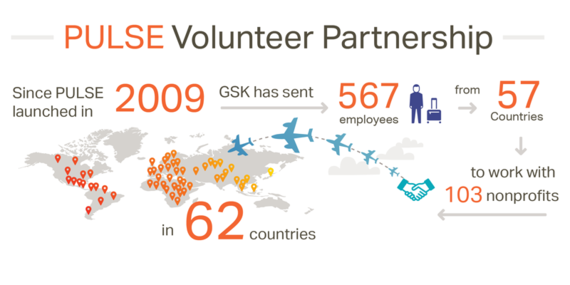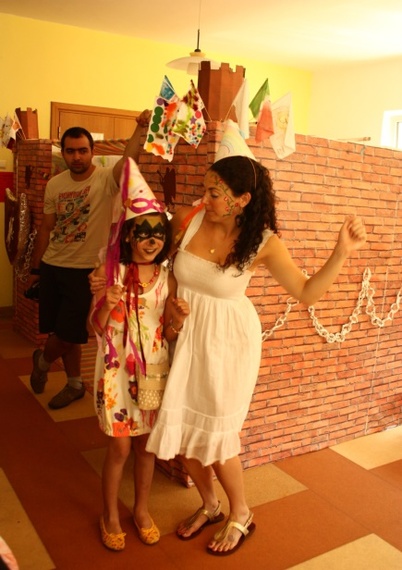Something is in the water at GSK offices. A few months ago I learned of GSK's PULSE employee volunteer program through a mutual friend who shared their recent Impact Report. Truly amazed by the global effects that PULSE has generated thus far, I investigated further, talking to leaders at GSK who run the program as well as employees who have been on a PULSE assignment. Every single person I have spoken to at GSK is evangelical about working there and massive proponents of CEO Sir Andrew Witty's leadership. It is rare to have numerous conversations within a large multinational company, with people who are spread out among various offices here in the US and the UK, and especially with one of the big pharmaceutical companies, no less, where employees universally embrace not only the mission and vision of GSK but express their solidarity with its senior leadership and loyalty for the companies' investment in developing high potentials through programs like PULSE.
Background - The Origins of PULSE
The PULSE program is the brainchild of Witty who several years ago publicly committed to starting an internal effort that would engage GSK employees to serve humanity. As Witty recently shared, "PULSE volunteers are a part of how we are evolving the culture of the organization and the spirit of the company to stay in step with society. They represent a cadre of people who, over time, are bringing back a bigger view of the world, a changed perspective, that brings the outside-in and helps make GSK a much better company." Finding ways to expand their knowledge base and support an NGO's efforts on the ground are at the heart of PULSE which is a fully funded sabbatical, running from 3-6 months full-time, wherein an employee at GSK applies and if selected through a rigorous process are matched with a non-profit somewhere in the developing world where their skillsets will be uniquely employed. The impact of this work has been tremendous both for the non-profits that are engaging PULSE volunteers as well as for volunteers themselves who have each expressed how transformative the program has been not only professionally but personally. And though it is not detailed in their annual impact report, efforts like this have generated a tremendous amount of employee loyalty for those who complete the program. This will be a considerable competitive advantage in years to come as the fruit of PULSE pays dividends in the higher retention rates and I would argue recruitment of high potential employees. It is rare that a volunteer employee effort yields so many incredible, lasting results. This is an effort that should not only be scaled within GSK but replicated across all of big pharma and within any company looking to force multiply the effects of its internal employee volunteerism efforts.
The Last Person I Expected to Be Inspired By Was a Pharma Professional
And yet that's just what happened a week ago here in San Francisco. I had the great fortune of meeting Courtney Lundquist who is a Thunderbird grad and the Immunology Disease Educator Manager for the Western US at GSK. Courtney generously shared her PULSE experience which entailed raising over $2.2m euro for a children's hospice in Bucharest, Romania. For someone who has at varying turns sold vaccines globally and been immersed in pandemic disease response for GSK, to hear her share stories of helping terminally ill children in a country where she didn't speak the language and knew no one to raising a record breaking amount of capital so they could build a new children's hospital, it was in short inspiring and awesome to see and feel how this experience changed her. She is speaking this week at PYXERA Global's Global Engagement Forum in DC and I hope decision makers and thought leaders in the Sustainable Development community are listening. Here in PULSE is a best practice that should be replicated in every company in every industry. Lundquist wrote an incredible essay detailing her PULSE experience and I'm sharing excerpt below to give you a sense of how the effort changed her and transformed a community:
When I arrived in Bucharest, my first job was to work at a summer camp for terminally ill children. This was a patient population I intentionally stayed away from in my hospice volunteer activities at home; I mean, who wants to be around dying children? I couldn't think of anything more depressing. But the truth is, kids die too. And they actually do it with much more grace and pizzazz than the adults I know who have done it. These kids were and are amazing - they just wanted to be treated like regular kids. They wanted to play make believe and have water gun fights and race each other (and if they were too sick to race themselves, they wanted me to push them in wheel chairs or carry them and race as fast as I could).
These kids chose happiness every moment. They chose love and connection and showed me happiness isn't dictated by circumstances, it's dictated by attitude. One insightful 12 year old told me, with the aid of a translator, "Sometimes I think I don't matter because if I mattered I wouldn't have gotten sick. But sometimes I think I want to dress up as a knight. And it makes me realize that just because I think something, it doesn't mean it's true. So I just try to think the things true that I want to be true. So do you want to dress up like a princess while I dress up like a knight?"
Indeed, I would like to dress up like a princess. These little human beings, a fraction of my age, not speaking my language, made me know if they could do it, I could do it. So I set off to fundraise to the tune of €1MM. Not a small task in a developing country.
Changing the Paradigm for Medicine Delivery in Romania
Throughout my fundraising journey I continued to give patient care. I told high powered executives the incredible stories of my patients and their families. When I was really in tune with the plight of my patients, I moved people. This was the competitive edge of my hospice - a true intrinsic link to our patients. Putting our patients first required that we change the paradigm for medicine delivery in Romania (at least, how medicine was delivered at our hospice in Romania). We paid our health care providers more than the typical wage they would receive in a practice; we did this to stop behavior that was par for the course in delivering medicine - charging patients above regular costs for treatment in order to supplement unlivable wages. We deployed nurses based on geography; so instead of our nursing team spending all day on buses (as was the case in many local practices with home visits) we implemented an efficiency model to ensure our patients were seen and that our nurses had a work life balance. By broadening our focus to the general challenges of receiving healthcare, instead of just implementing palliative care itself, we began to manifest our vision - that everyone affected by terminal or life-limiting illnesses have access to free of charge specialized services at the appropriate time and that their families should be able to receive counseling and support.
Long story short, I made my goal - actually, I sleighed my goal; I raised $2.2MM to fund the building of a new hospice in Bucharest. We opened the first hospice in Bucharest in September. What I am clear about is there is nothing truer than what my 12 year old, wise, dying friend told me "just because I think something, it doesn't mean it's true. So I just try to think the things true that I want to be true."
For Impact by 2030 We Need More Programs Like PULSE In Every Global Company
Imagine if every global company embraced the PULSE employee volunteer model. With all of the attention recently on the Sustainable Development Goals and companies racing to define their leadership space within Impact 2030 one would hope that numerous best practices like this one will be distilled out, emulated and replicated. The international development community spends so much time, energy and resources at times reinventing the wheel rather than focusing on replicating what works. Here's one model, now we just need more companies to take it and run with it. The world is depending on it.


